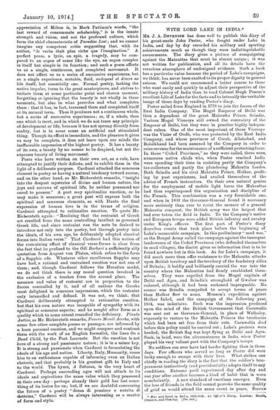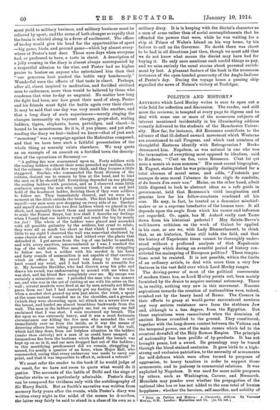WITH LORD LAKE IN INDIA.*
Ma. J. A. DEVENT88 has done well to publish this diary of his great-nixie John Pester, who fought under Lake in India, and day by day recorded his military and sporting achievements much as though they were indistinguishable amusements. The diary gives a picture of campaigning against the Mabrattas that must be almost unique; it was not written for publication, and all its details have the veracious atmosphere of undesigned evidence. Such a hook has a particular value because the period of Lake's campaigns, we think, has never been exalted to its proper dignity in general esteem. We could not recommend a better course to those who want easily and quickly to adjust their perspective of the military history of India than to read Colonel Hugh Pearse's excellent Life of Lake for the fasts and to intensify the veritable image of those days by reading Pester's diary.
Pester sailed from England in 1778 to join the forces of the East India Company. The Mogul Emperor of Delhi was then a dependent of the great Mahratta Prince, Scindia. Various Mogul Viceroys still owned the suzerainty of the Emperor of Delhi, but they were in practice highly indepen- dent rulers. One of the most important of these Viceroys was the Vizier of Oudb, who was protected by the East India Company, and whose provinces of Corah, Allahabad, and Rohilk hand bad been annexed by the Company in order to raise revenue for the maintenance of asufficient protecting force. In these "Ceded Provinces," as they were called, there were, numerous native chiefs who, when Pester reached India were spending their time in resisting partly the Company's tax-collectors and partly the plundering Mahratta hordes. Both Scindia and his rival Mahratta Prince, Holkar, profit- ing by past experiences, had availed themselves of the advice of French instructors. On their own natural genius for the employment of mobile light horse the Mabrattas had thus superimposed the organization and discipline of the French. This combination was a very formidable one, and when in 1803 the Governor-General found it necessary more seriously than ever to resist the menace of a general Mahratta conquest, the British army was the largest that had ever taken the field in India. To the Company's native and European troops were added British infantry and cavalry under King's officers. The first part of Pester's diary describes events that took place before the beginning of Lake's memorable campaign. In this preliminary " mud war," as the Bengal Army called the campaign against the insurgent landowners of the Ceded Provinces (who defended themselves in mud villages), the diarist gives us information that is to be found nowhere but in this hook. As for Lake's campaign, it did much more than offer resistance to the Maltratta attacks upon British territory and the territory of the feudatory allies of Britain ; it boldly and brilliantly carried the war into the country where the Ifahrattas had firmly established them- selves. They were expelled from the Mogul capitals of Delhi and Agra, and Scindia's stronghold of Gwalior was reduced, although it had beets reckoned impregnable. No sooner was Scindia compelled to accept terms of peace than Holkar flew to arms. Monson's expedition against Holkar failed, and the campaign of the following year 180.1, was indecisive. Such was the impression produced upon the mind of the British Government that Cornwallis was sent out as Governor-General, in place of Wellesley, expressly to restore to the Maltratta Princes the territories which had been set free from their rule. Cornwallis died before this policy could be carried out ; Lake's protests were heeded; the British flag was kept flying at Delhi and Agra. Such, in brief, were the circumstances in India when Pester played his very valiant part with the Company's troops.
No soldiers can ever have had harder fighting than in those days. Few officers who served so long as Pester did were lucky enough to escape with their lives. What strikes one chiefly in reading the diary is the fact that the soldier's tem. perament instinctively (and providentially) adapts itself to any conditions. Extreme peril experienced day after day and one year after another becomes a kind of habit that is worn nonchalantly. A new standard of emotions emerges. Even the loss of friends in the field cannot provoke the same quality of grief as would attend the same event in peace. Sorrow
• War sad Swot it. /surd, 1802.18341: an Oitceie Diary, London, liett,th Conlon, and Ouszley. [15s. net.]
must yield to military business, and military business mast be relieved by sport; and the scene of both changes so rapidly that the brain is whirled along in a fever of excitement. The officer of to-day would give his head for the opportunities of sport —big game, birds, and ground game—which lay almost every- where at Pester's tent door. Those were days when everyone had, or professed to have, a taste in claret. A description of a jolly evening in the diary is almost always accompanied by a respectful allusion to the wine, and Pester had no higher praise to bestow on anyone who entertained him than that "our generous host pushed the bottle very handsomely." Wonderful were the effects of that taste in claret. Perhaps, after all, claret inspired to meditation, and fortified civilized man to endurance, more than would be believed by those who condemn that wine to-day as ungenial. No matter bow long the fight had been, nor how great their need of sleep, Pester and his friends must fight the battle again over their claret. It may be said that one day was very much like another, and that a long diary of such experiences—merely ringing the changes incessantly on bayonet charges, grape-shot, sealing ladders, tigers, elephants, hares, partridges, and claret—is bound to be monotonous. So it is, if you please; and yet after reading the diary we feel—indeed we know—that of just such "monotony" was a campaign against the Mahrattas composed, and that we have here such a faithful presentation of the whole thing as scarcely exists elsewhere. We may quote as an example of an assault on a fortified town the descrip- tion of the operations at Sarssney :—
" A galling fire now commenced upon us. Forty soldiers with the scaling ladders without their arms preceded my section, which led the column the shot flew very thick, and they became a little staggered. Sinclair, who commanded the front division of the column, desired mo to remain by him at the head, and to lead the men on if he should fall. Everything depended on our placing the scaling ladders with precision, and as I observed some little confusion among the men who carried them, I ran on and laid hold of the headmost ladder, desiring them if they were soldiers- to follow me. They immediately cheered, and we were in a moment at the ditch outside the breach. The first ladder I placed myself—our men were now dropping on every side of us. Sinclair and myself descended the two first ladders which we placed in the ditch, and instantly turned them and mounted on the fort side to scale the Fausse Braye, but how shall I describe my feelings when I found that our ladders would not reach the top by nearly ten feet ! The whole of the ladders were placed and ascended with all possible gallantry by the soldiers, but cruel to relate, they were all as much too short as that which I mounted. A little to any right I observed the wall was somewhat shattered by some chance shot of ours which had lobbed over the glacis that defended it. I got across from the top of one ladder to another, and with every exertion, unencumbered as I was, I reached the top of the wall alone. The men were ineffectually struggling to follow me, but is soldier with his musket in his hand and forty rounds of ammunition is not capable of that exertion which an officer is. My sword was slung by the sword- knot round my wrist, and I had both hands to scramble for it. My favourite Ilavildar, who had thrown away his pike and drawn his sword, was endeavouring to ascend with me when he was shot, and his blood flew completely over me. My escape was certainly a miraculous one. I pistolled the man who was nearest me, and who was in the act of cutting at me with his sabre on the wall ; several muskets were fired at me by men actually not fifteen paces from me ! but I had scarcely got my footing on the wall when a musket shot grazed my arm just above the wrist, a spear at the same instant wounded me in the shoulder, and a grenade (which they were showering upon us) struck me a severe blow on the breast, and hurled me almost breathless backwards from the wall. The men in the ladders caught me, but on seeing me fall exclaimed that I was shot. I soon recovered my breath. The lire upon us was extremely heavy, and it was a most fortunate circumstance our killing the few men who ascended the wall immediately over us from the inside, as it was the means of deterring others from taking possession of the top of the wall, which had they done, from our helpless situation in the ladders (under them entirely) not a man of us could have escaped. A tremendous fire from the bastions which flanked the breach was kept up on us in it, and our men dropped fast out of the ladders ; in this mortifying predicament did we remain, struggling to ascend, for nearly a quarter of an hour, when Major Ball, who commanded, seeing that every endeavour was made to carry our point, and that it was impossible to effect it, ordered a retreat."
We must refer the reader to the book if he would judge of its merit, for we have not room to quote what would do it justice. The accounts of the battle of Delhi and the siege of Greener strike us as particularly admirable. Pester's diary can be compared for vividness only with the autobiography of Sir Harry Smith. But as Smith's narrative was written from memory forty years after the events, while Pester's diary was written every night in the midst of the scenes he describes, the latter may fairly be said to stand in a class of its own as a
military diary. It is in keeping with the diarist's character as a man of arms rather• than of social accomplishments that he offended the powers that were, while he was waiting for a ship at Prince of Wales's Island on his way home, by his failure to call on the Governor. No doubt there was claret to be had in all directions just then, though we must add that we do not know what means the diarist may have had for buying it. He only once mentions such sordid things as pay, and we miss entirely the usual stories about personal enrich- ment by loot. A pleasant feature of the book is the numerous instances of the open-handed generosity of the Anglo-Indians of Pester's day. Dining the voyage home a passing ship. signalled the news of Nelson's victory at Trafalgar.







































 Previous page
Previous page